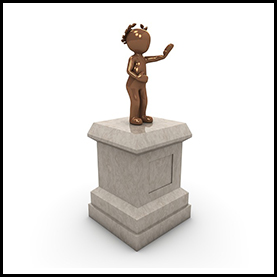 How do individuals of each Enneagram type relate to authority figures, all other factors being equal (which they are not!) such as family background, religious orientation, and past experiences with extremely negative authorities? People of the same type do tend to respond similarly to authority figures!
How do individuals of each Enneagram type relate to authority figures, all other factors being equal (which they are not!) such as family background, religious orientation, and past experiences with extremely negative authorities? People of the same type do tend to respond similarly to authority figures!
Ones
Ones tend to be more structurally oriented and respect official roles and, as a result, will respond to most authority figures, at least initially, as if these individuals are entitled to their authority. However, should authority figures act in ineffective or even abusive ways, most Ones will not adhere to their rules of directives and may eventually rebel against them.
Twos
More than not, Twos try to make themselves useful and helpful to authority figures, carving out space to be supportive and giving them the benefit of the doubt should the authority figure falter. Twos will, if possible, help these leaders examine what can be done to augment or adjust ineffective behavior. However, should authority figures become abusive to others, Twos will turn away from such a person and even fight on behalf of others, even more than Twos will fight for themselves.
Threes
In general, Threes do not have assumptions about authority figures. If these leaders allow opportunities for Threes to perform effectively, no problem. However, if leaders change goals constantly or arbitrarily or if leaders either put too many obstacles on the path to optimal performance, Threes will become highly frustrated and even disengaged.
Fours
Fours need room to do their own thing and to do their own thing in their own way. When authority figures provide this degree of latitude, all is fine. However, when Fours experience too much structure or when authority figures are too omnipresent, at least from the Four’s perspective, Fours will withdraw and/or find fault with the authority figure, the system, of both.
Fives
The Head Center types (5, 6, and 7), pay the most attention to authority figures; they are the three types from the emotion of fear and, as such, are more fearful or concerned about authority. The Five strategy is to withdraw, observe authority figures, and to strategize how to manage that relationship.
Sixes
Sixes have the most ambivalence about authority figures, looking to them to make Sixes feel safe and watchful or concerned that authority figures will not do so. In general, Sixes have extreme reactions to leaders. Sixes will tend to idealize an authority figure they perceive as a good one, perceiving that person as extremely good, effective, supportive, and non-abusive. However, should the leader display any behavior that concerns the Six, the “fall from grace” can be extreme, with the leader then being perceived as extremely bad.
Sevens
Because Sevens are all about living their lives with no restrictions, they do not really perceive themselves as working for anyone or having a real boss, even though they technically do. What do Sevens do? The first tactic is to befriend the boss. The unconscious reasoning is this: If I am friends with my boss, then he/she is really my friend, not my boss! If tactic 1 does not work, Sevens then ignore the boss, as in We are both here, each doing our own thing! If, ultimately, tactic two fails, Sevens can become extremely rebellious should the boss try to put any limits on them, even publically challenging the authority figure in public.
Eights
Eights believe that authority is earned, not something that comes with a particular role. If a leader earns their respect, Eights will be willing to cooperate and collaborate. If not, watch out! Eights will either ignore, challenge, or take over.
Nines
Nines do not carry a positive or negative view of leaders. Instead, they try to cooperate when possible, but do become concerned when an authority figure engages in behavior that causes tension or disharmony that the Nine believes could or should have been avoided.
Hopefully, reflecting on our type-based responses to authority will help us in our own development, assist employees to understand and enhance their ability to work with their bosses, and help leaders understand how and why employees of different enneatypes respond in such a wide variety of ways to them as authority figures.

Comments are closed.